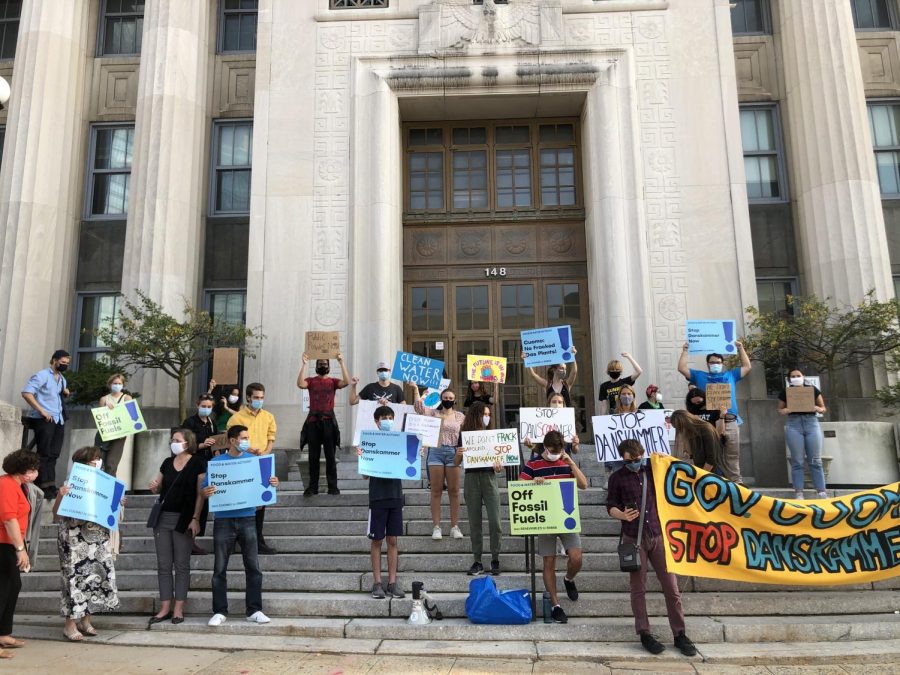MHS Students Work to Halt Danskammer Plant
Students from across Westchester join to protest against the proposal for a fracked gas power plant.
November 11, 2020
In July of 2019, New York State passed The Climate Leadership and Community Protection Act (CLCPA), one of the most ambitious climate laws in the world, demanding the NY economy to reduce greenhouse gas emissions by 40 percent by 2030 and 85 percent by 2050 compared to 1990 levels. The law also created a Climate Action Council for the state with the role of recommending ways to help New York meet its climate goals and keep it on a path towards carbon neutrality. This was recognized as a major step forward for New York in regards to its environmental policy, but this recent reform has not fixed all of NY’s climate issues.
On September 25, MHS students and other young climate activists could be seen marching and congregating outside of the White Plains’ Board of Legislators office in White Plains. The group was carrying signs, chanting, and giving speeches about the way a proposed natural gas plant would adversely impact New York’s environmental goals.
The Danskammer Power plant is a fossil-fuel based power plant in Newburgh, New York that is about sixty years old. The plant runs at about five percent capacity and is only running a couple days a year. Now, there is a proposal to build a new natural gas plant next to the old Danskammer plant that would run almost all the time.
Local climate activists are robustly opposed to this proposal to create the new Danskammer power plant. They claim this new plant would extend New York’s reliance on fossil fuels and fracked gas (energy sources that are proven to be harmful to the environment) for decades and that it will be a huge step back in reaching the goals set out in the CLCPA. Additionally, the Stop Danskammer coalition explains that adding the plant will accelerate the process of climate change by emitting forty times the amount of greenhouse gases per year than the old one, a number equivalent to adding over 200,000 cars passenger cars to the roads of Hudson Valley.
Environmentalists even go beyond fossil fuels when arguing against Danskammer. They are concerned about the decline in air quality that the plant will bring to surrounding neighborhoods, a decline that can increase the risk of asthma attacks, lung cancer, and other respiratory illnesses.
One reason for the proposal of the new power plant in Newburgh is the closure of Indian Point, a nuclear power plant in New York that provided a lot of energy for the state but, with age, was becoming increasingly dangerous. Many people believe that a new power plant is needed to replace this energy source and are questioning the reliability and efficiency of energy in the area without this plant, even though this thought was considered when Indian Point’s closure was agreed upon.
Mrs. Andrews, the AP Environmental Science teacher at Mamaroneck High School, understands why the repowering of the Danskammer plant is getting attention with the closing of Indian Point and the questions of energy reliability and efficiency , but believes “the ambitious and necessary goals by NYS to adopt more “green” energy sources should be prioritized.” She says, “Repowering Danskammer is a relatively short-term action plan, while progressing towards 100 percent renewable energy is more sustainable and cost-effective.”
MHS students definitely agree that New York should be prioritizing moving towards renewable energy, as demonstrated by their involvement in the protest in White Plains. These students, including MHS students Fatimah Khan (‘22), Jen Novick (‘22), Jena Vincelli (‘22), Michaela Loughran (‘22), and Caitlyn Carpenter (‘22), got involved with the movement against the Danskammer power plant through Sunrise Westchester, a hub of the national, youth-led Sunrise Movement that advocates for environmental justice. Sunrise Westchester has spent the last few months working to get towns in Westchester to pass municipal resolutions against the Danskammer Power Plant. The group has had success and passed resolutions in Hastings-on-Hudson, New Castle, Mount Vernon, and Peekskill, in addition to one in the Village of Larchmont and Town of Mamaroneck.
Sunrise Westchester also played a major role in organizing the protest at the White Plains board Board of Legislators’ office. Jen Novick, member and Social Media Coordinator for Sunrise Westchester, says that the hub helped organize the protest with members of Sunrise Bronx, Sunrise Sarah Lawrence, and Food and Water Watch. She says the purpose of the protest was to “draw attention to the Stop Danskmamer movement and hopefully elicit a response from Governor Cuomo.”
For those who are concerned about the Danskammer power plant and climate change more broadly, Novick suggests signing the petition to stop the plant (https://actionnetwork.org/petitions/stop-the-danskammer-energy-plant), calling their local officials to voice their concerns, and following Sunrise Westchester on Instagram @sunrisewestchester to get involved and stay up to date on local climate events.






